In Focus This Week
Arizona is Fostering a New Generation of Election Officials through Innovative Fellowship Program
By Christian Grose and Theo Menon
Election official turnover has been rising steadily, creating a recruitment challenge for election offices that must fill increasing large numbers of vacant positions.
The Arizona Secretary of State’s Office is leading the way with an innovative solution: the County Election Administration Fellowship Program. The program sought to address both current staffing shortages and the field’s long-term recruitment issues by hiring young people to work in election administration during the fall 2024 semester. Most fellows were embedded in a county office to work on election administration, and a few fellows worked in the Secretary of State’s office.
A new report from the Bipartisan Policy Center, the Elections Group, and the University of Southern California evaluates the effectiveness of the fellowship program with a focus on outcomes related to cultivating interest in careers in election administration and improving voter outreach.
Key findings include:
- Participation in the program increased fellows’ interest in pursuing careers in election administration. Three fellows have already accepted full-time positions in county election offices where they worked during their fellowships.
- The fellowship program led to increased interest in working in government, not just election administration.
- Participation in the fellowship program—including exposure to threats during the 2024 election—increased fellows’ interest in related fields such as election security, private security, IT, and election law.
- The Arizona fellowship program increased election workers’ ability to conduct outreach to voters by drawing on a younger and more diverse group of workers than is typically found in the permanent election administration workforce.
- Participation in the program improved fellows’ ability to work with voters across the political spectrum and increased their confidence in election outcomes.
- In addition to providing stopgap staffing at county offices, the fellowship program offered a low-cost way to encourage young people to join the election administration workforce.
Arizona’s fellowship model demonstrates how a relatively small, well-structured program can deliver promising results, including immediate staffing support, sparking long-term interest in election work, and laying the framework for a robust and resilient election workforce to preserve American democracy.
For states interested in adopting a similar program, our report also offers several recommendations and considerations:
- Define program goals in coordination with local officials: Clearly define the fellows’ responsibilities and the program’s goals in coordination with local officials to ensure a rich experience that educates fellows and helps address specific needs for county election offices.
- Determine how the program will be funded: The Arizona Secretary of State’s office paid for the fellowship program, ensuring that resource-stretched county election offices did not have to take on additional financial burdens.
- Identify a program manager and determine program structure: A designated program manager at the state level should oversee recruitment of fellows, training, logistics, and coordination with election offices.
- Expand recruitment to reach a broader pool of young people: Seek out applicants from a wide array of academic backgrounds including undergraduate students, graduate students, and nonstudents.
- Consider a pilot program to get started: Before launching a fellowship program statewide, states should consider a limited pilot program to assess feasibility and to avoid overburdening local election officials.
Read the full report here.
Christian Grose is a Professor of Political Science and International Relations and Public Policy at the USCDornsife and Theo Menon is a policy analyst with the Elections Project at Bipartisan Policy Center.
electionline Daily News Email
 What’s the best part of waking up? electionline Daily News in your inbox of course so be sure to sign up for your daily dose.
What’s the best part of waking up? electionline Daily News in your inbox of course so be sure to sign up for your daily dose.
Each morning you’ll receive the top headlines of the day, plus a listing of states featured in that day’s news round up.
To sign up, simply visit our site and provide us with your email and you’ll begin receiving the news in your inbox each morning.
We Google so you don’t have to!
Election News This Week
 Federal Update: This week in Washington was a bit quieter on the elections front than in weeks past, but that doesn’t mean it was quiet! The Associated Press takes a look at one of the technical changes under the presidential executive order which mandates that voting equipment, it says, should not use ballots that include “a barcode or quick-response code.” National Public Radio has two stories this week on the U.S. Department of Justice. One looks at the affects changes to DOJ are having on staffing in the Civil Rights Division and the other looks at DOJ’s move to focus on voter fraud with assistance from the Department of Government Efficiency. On the legislative front, A letter signed by a group of 40 bipartisan state attorneys general called on Congress to reject an “irresponsible” federal measure that would bar states from enforcing their own laws and regulations governing the use of artificial intelligence systems for the next 10 years. The letter from the National Association of Attorneys General said the “broad” state AI moratorium measure rolled into the federal budget reconciliation bill would be “sweeping and wholly destructive of reasonable state efforts to prevent known harms associated with AI.” “This bill does not propose any regulatory scheme to replace or supplement the laws enacted or currently under consideration by the states, leaving Americans entirely unprotected from the potential harms of AI,” the letter read. “Moreover, this bill purports to wipe away any state-level frameworks already in place. Imposing a broad moratorium on all state action while Congress fails to act in this area is irresponsible and deprives consumers of reasonable protections.”
Federal Update: This week in Washington was a bit quieter on the elections front than in weeks past, but that doesn’t mean it was quiet! The Associated Press takes a look at one of the technical changes under the presidential executive order which mandates that voting equipment, it says, should not use ballots that include “a barcode or quick-response code.” National Public Radio has two stories this week on the U.S. Department of Justice. One looks at the affects changes to DOJ are having on staffing in the Civil Rights Division and the other looks at DOJ’s move to focus on voter fraud with assistance from the Department of Government Efficiency. On the legislative front, A letter signed by a group of 40 bipartisan state attorneys general called on Congress to reject an “irresponsible” federal measure that would bar states from enforcing their own laws and regulations governing the use of artificial intelligence systems for the next 10 years. The letter from the National Association of Attorneys General said the “broad” state AI moratorium measure rolled into the federal budget reconciliation bill would be “sweeping and wholly destructive of reasonable state efforts to prevent known harms associated with AI.” “This bill does not propose any regulatory scheme to replace or supplement the laws enacted or currently under consideration by the states, leaving Americans entirely unprotected from the potential harms of AI,” the letter read. “Moreover, this bill purports to wipe away any state-level frameworks already in place. Imposing a broad moratorium on all state action while Congress fails to act in this area is irresponsible and deprives consumers of reasonable protections.”
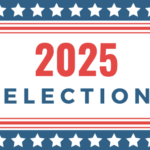 2025 Elections: 2025 Elections: Elections were held in several states this week including Idaho, Oregon and Pennsylvania. Like many springtime “off year” elections, the story making headlines was overall low turnout. In Idaho, turnout was around 13% of registered voters, according to preliminary data from the Secretary of State’s office. “These May elections always are a little bit lower turnout,” Secretary of State Phil McGrane said. “A lot of people weren’t necessarily sure what they were voting on. These are hyperlocal elections. So, we had highway districts, library districts, sewer districts, water districts … probably what drew the most attention, though, were bonds and levies.” In Oregon, where voters decided on a range of local measures, including school board races, infrastructure bonds, public safety levies, and education funding, turnout was roughly 20%. Voters finished voting on Tuesday in Pennsylvania and Secretary of the Commonwealth Al Schmidt said that “it’s been a relatively calm and successful primary election day,”. Butler County Bureau of Elections successfully introduced e-poll books at one precinct in Franklin Township. The Luzerne County Bureau of Elections conducted problem-free elections County Manager Romilda Crocamo said after polls closed. “We had a very good day here in Luzerne County,” Crocamo said. “I want to commend the staff. It was really a joint effort between the election bureau, we had other staff members and of course the sheriffs are here. At one point, I went into the bureau, and the phones weren’t ringing at all. I love the sound of that silence. It was a good day, and I have to applaud the staff.” Election workers in Lehigh and Northampton counties reported no major issues during the day. But no election would be complete without a gas issue. A polling place in Allegheny County was shut down and moved to a new location after officials reported the smell of natural gas in the area. “A quiet day like today is a testament to the hard work and dedication of our county election officials, especially those new ones who are running elections for the first time and have done their part to make sure voters in their counties can cast their ballot and make their voice heard,” Schmidt said.
2025 Elections: 2025 Elections: Elections were held in several states this week including Idaho, Oregon and Pennsylvania. Like many springtime “off year” elections, the story making headlines was overall low turnout. In Idaho, turnout was around 13% of registered voters, according to preliminary data from the Secretary of State’s office. “These May elections always are a little bit lower turnout,” Secretary of State Phil McGrane said. “A lot of people weren’t necessarily sure what they were voting on. These are hyperlocal elections. So, we had highway districts, library districts, sewer districts, water districts … probably what drew the most attention, though, were bonds and levies.” In Oregon, where voters decided on a range of local measures, including school board races, infrastructure bonds, public safety levies, and education funding, turnout was roughly 20%. Voters finished voting on Tuesday in Pennsylvania and Secretary of the Commonwealth Al Schmidt said that “it’s been a relatively calm and successful primary election day,”. Butler County Bureau of Elections successfully introduced e-poll books at one precinct in Franklin Township. The Luzerne County Bureau of Elections conducted problem-free elections County Manager Romilda Crocamo said after polls closed. “We had a very good day here in Luzerne County,” Crocamo said. “I want to commend the staff. It was really a joint effort between the election bureau, we had other staff members and of course the sheriffs are here. At one point, I went into the bureau, and the phones weren’t ringing at all. I love the sound of that silence. It was a good day, and I have to applaud the staff.” Election workers in Lehigh and Northampton counties reported no major issues during the day. But no election would be complete without a gas issue. A polling place in Allegheny County was shut down and moved to a new location after officials reported the smell of natural gas in the area. “A quiet day like today is a testament to the hard work and dedication of our county election officials, especially those new ones who are running elections for the first time and have done their part to make sure voters in their counties can cast their ballot and make their voice heard,” Schmidt said.
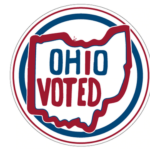 A Sticky Situation: Controversy has come to the world of the “I Voted” sticker. Emily Cook, an Ohio artist claims that her “Ohio Voted” sticker design has been used by the state of Louisiana without her permission. Cook, who designed the sticker for Ohio voters, noticed a similar design on Louisiana’s website. Cook won a 2019 design contest conducted by the Ohio Secretary of State Frank LaRose. Her winning image states the words “OHIO VOTED” within the shape of Ohio and bordered by red and blue circles. “I was just shocked. I was shocked. I said flabbergasted, I think,” said Cook regarding Louisiana’s similar design, pattern, and coloring. “Did they ask somebody’s permission? How long has it been circulating? Is it just online?” ABC6 Investigates
A Sticky Situation: Controversy has come to the world of the “I Voted” sticker. Emily Cook, an Ohio artist claims that her “Ohio Voted” sticker design has been used by the state of Louisiana without her permission. Cook, who designed the sticker for Ohio voters, noticed a similar design on Louisiana’s website. Cook won a 2019 design contest conducted by the Ohio Secretary of State Frank LaRose. Her winning image states the words “OHIO VOTED” within the shape of Ohio and bordered by red and blue circles. “I was just shocked. I was shocked. I said flabbergasted, I think,” said Cook regarding Louisiana’s similar design, pattern, and coloring. “Did they ask somebody’s permission? How long has it been circulating? Is it just online?” ABC6 Investigates  reached out to the Louisiana Secretary of State’s office several times for an explanation. No one from the Louisiana Office has responded to say where they obtained the image. [Editor’s Note: As “I Voted” sticker scholars, we can chime in here and note that while the artwork may be appearing online, it’s NOT the sticker that Louisianans got when they cast their ballots in 2024. We also were unable to find out where exactly the image is being used on the Louisiana elections website, although a page where you should be able to download an “I Voted” sticker comes up with an error.] The Louisiana secretary of state’s office did not respond to a reporter’s inquiry and the Ohio secretary of state’s office sent WSYX the following statement: “Imitation is the sincerest form of flattery. Ohio sets the national standard for election integrity, and apparently for ‘I Voted’ sticker designs too.”
reached out to the Louisiana Secretary of State’s office several times for an explanation. No one from the Louisiana Office has responded to say where they obtained the image. [Editor’s Note: As “I Voted” sticker scholars, we can chime in here and note that while the artwork may be appearing online, it’s NOT the sticker that Louisianans got when they cast their ballots in 2024. We also were unable to find out where exactly the image is being used on the Louisiana elections website, although a page where you should be able to download an “I Voted” sticker comes up with an error.] The Louisiana secretary of state’s office did not respond to a reporter’s inquiry and the Ohio secretary of state’s office sent WSYX the following statement: “Imitation is the sincerest form of flattery. Ohio sets the national standard for election integrity, and apparently for ‘I Voted’ sticker designs too.”
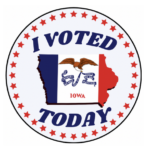 Sticker News: Dallas County, Iowa Auditor Todd Halbur announced the winner of the 2025 “I Voted” Sticker Contest is 7th grader Olin Jepsen! Earning 217 out of 583 votes cast, Olin Jepsen’s design has won Dallas County’s first official “I Voted” Sticker Contest. The contest opened on March 10th with submissions due by April 7th. The office received ten submissions, five of which qualified as finalists. A
Sticker News: Dallas County, Iowa Auditor Todd Halbur announced the winner of the 2025 “I Voted” Sticker Contest is 7th grader Olin Jepsen! Earning 217 out of 583 votes cast, Olin Jepsen’s design has won Dallas County’s first official “I Voted” Sticker Contest. The contest opened on March 10th with submissions due by April 7th. The office received ten submissions, five of which qualified as finalists. A 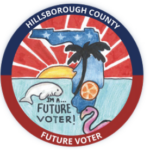 public vote was held on the county website from April 14th to May 11th, after which Jepsen was declared the winner. Olin will be presented with a 1st Place certificate at the 6/10/2025 meeting of the Dallas County Board of Supervisors at 800 Court Avenue in Adel. Jepsen’s design will be printed on stickers that will be handed out to voters at the polls in Dallas County this November for the city/school elections. Congratulations to
public vote was held on the county website from April 14th to May 11th, after which Jepsen was declared the winner. Olin will be presented with a 1st Place certificate at the 6/10/2025 meeting of the Dallas County Board of Supervisors at 800 Court Avenue in Adel. Jepsen’s design will be printed on stickers that will be handed out to voters at the polls in Dallas County this November for the city/school elections. Congratulations to 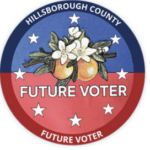 Lauren McGee and Gabriel Angeli for taking first place in their categories in the Hillsborough County, Florida Future Voter sticker contest. “We are getting these people engaged at an early age, and they are going to learn about the voting process. As a matter of fact, today we are going to give these people a tour, a backroom tour of our office here,” said Supervisor of Elections Craig Latimer. Latimer said the “Future Voter” sticker will be given out not only on election day but throughout the year. “We do a lot of registration events and public displays around the entire county, and we always take the stickers with us, and they are a hot item. The little ones love the stickers. They want to put them all over themselves, so it’s always a good time,” said Latimer.
Lauren McGee and Gabriel Angeli for taking first place in their categories in the Hillsborough County, Florida Future Voter sticker contest. “We are getting these people engaged at an early age, and they are going to learn about the voting process. As a matter of fact, today we are going to give these people a tour, a backroom tour of our office here,” said Supervisor of Elections Craig Latimer. Latimer said the “Future Voter” sticker will be given out not only on election day but throughout the year. “We do a lot of registration events and public displays around the entire county, and we always take the stickers with us, and they are a hot item. The little ones love the stickers. They want to put them all over themselves, so it’s always a good time,” said Latimer.
Personnel News:Ingham County Clerk Barb Byrum is running for Michigan secretary of state. Natalie Adona, the Nevada County, California clerk-recorder/registrar of voters, is resigning effective June 6 to head the Marin County Elections Department. Max Deitchler has resigned from the Washington County, Arkansas election commission. Lincoln County, Montana Election Administrator Melanie Howell is back on the job after being placed on administrative leave on March 31. Santa Fe County Clerk, Katharine Clark is considering a run for New Mexico secretary of state. Melissa Avant is the new Cochise County, Arizona elections director. Christina White is leaving the Miami-Dade County, Florida elections department. Democrat Ryan Peterman announced he will run for Iowa secretary of state in the 2026 election. Casey Garmon is the new Avery County, North Carolina board of elections director.
Ballot Measures, Legislation & Rulemaking
 Alaska: According to the Alaska Beacon, a major elections reform bill, a priority of House and Senate leaders, is dead in the Legislature. May 21 was the last day of the regular legislative session, and members of the House’s multipartisan majority said on May 17 that they lack the support needed to overcome the opposition of the House’s Republican minority in the time they have left. Bills don’t expire at the end of the first year of the two-year legislative session, but Senate Bill 64 needed to become law this year in order to be implemented in time for the 2026 election. Among the changes in the bill: Speedier ballot counting, better tracking of absentee ballots, ballot dropboxes across the state, free return postage for absentee ballots, a liaison to help fix voting issues in rural Alaska, permanent absentee ballot registration, a method to fix paperwork problems after an absentee ballot is cast, the elimination of the requirement that a “witness” sign a voter’s absentee ballot, and additional security audits. Many of the House’s Republicans objected to the bill, saying that they believe it did not do enough to address their concerns about election security. The Senate passed SB 64 on May 12, but Rep. Neal Foster, D-Nome and co-chair of the House Finance Committee said that House Republicans were prepared to offer so many amendments to the bill that it would have required members of the House to abandon all other work in order to push the bill across the finish line. Even then, it could have been vetoed by Gov. Mike Dunleavy, a Republican.
Alaska: According to the Alaska Beacon, a major elections reform bill, a priority of House and Senate leaders, is dead in the Legislature. May 21 was the last day of the regular legislative session, and members of the House’s multipartisan majority said on May 17 that they lack the support needed to overcome the opposition of the House’s Republican minority in the time they have left. Bills don’t expire at the end of the first year of the two-year legislative session, but Senate Bill 64 needed to become law this year in order to be implemented in time for the 2026 election. Among the changes in the bill: Speedier ballot counting, better tracking of absentee ballots, ballot dropboxes across the state, free return postage for absentee ballots, a liaison to help fix voting issues in rural Alaska, permanent absentee ballot registration, a method to fix paperwork problems after an absentee ballot is cast, the elimination of the requirement that a “witness” sign a voter’s absentee ballot, and additional security audits. Many of the House’s Republicans objected to the bill, saying that they believe it did not do enough to address their concerns about election security. The Senate passed SB 64 on May 12, but Rep. Neal Foster, D-Nome and co-chair of the House Finance Committee said that House Republicans were prepared to offer so many amendments to the bill that it would have required members of the House to abandon all other work in order to push the bill across the finish line. Even then, it could have been vetoed by Gov. Mike Dunleavy, a Republican.
 District of Columbia: A bill that would stop noncitizens from voting in Washington, D.C., elections passed through the U.S. House Oversight Committee this week, advancing closer to a floor vote. The bill, H.R.884, would prohibit noncitizens from voting in District elections and repeal the Local Resident Voting Rights Amendment Act of 2022, which allows noncitizen district residents to vote in such elections. The bill is sponsored by Rep. August Pfluger (R-TX) and has earned the co-sponsorship of at least 14 other House Republicans, including Reps. Nancy Mace (R-SC), Byron Donalds (R-FL), and Lauren Boebert (R-CO). Democrats and District officials have shown opposition in the past to the bill, which passed the House last year with most Republicans voting “aye” and 52 Democrats voting in favor. The Senate never put the bill to a vote. “Over the past two years, our residents have repeatedly suffered the indignity of having politicians elected elsewhere — politicians who aren’t accountable to District residents — attempt to usurp the authority of our elected officials,” District of Columbia Council Chairman Phil Mendelson and Washington, D.C., Attorney General Brian Schwalb, both Democrats, wrote in a letter to House leadership ahead of the initial vote, which denied the bill’s passage before the second vote succeeded.
District of Columbia: A bill that would stop noncitizens from voting in Washington, D.C., elections passed through the U.S. House Oversight Committee this week, advancing closer to a floor vote. The bill, H.R.884, would prohibit noncitizens from voting in District elections and repeal the Local Resident Voting Rights Amendment Act of 2022, which allows noncitizen district residents to vote in such elections. The bill is sponsored by Rep. August Pfluger (R-TX) and has earned the co-sponsorship of at least 14 other House Republicans, including Reps. Nancy Mace (R-SC), Byron Donalds (R-FL), and Lauren Boebert (R-CO). Democrats and District officials have shown opposition in the past to the bill, which passed the House last year with most Republicans voting “aye” and 52 Democrats voting in favor. The Senate never put the bill to a vote. “Over the past two years, our residents have repeatedly suffered the indignity of having politicians elected elsewhere — politicians who aren’t accountable to District residents — attempt to usurp the authority of our elected officials,” District of Columbia Council Chairman Phil Mendelson and Washington, D.C., Attorney General Brian Schwalb, both Democrats, wrote in a letter to House leadership ahead of the initial vote, which denied the bill’s passage before the second vote succeeded.
 Indiana: Gov. Mike Braun has been signing into law a slew of bills changing voting and the administration of elections that passed through the Legislature during the 2025 Senate Enrolled Act 10, which prohibits students from using their college IDs as their identification card to verify who they are when checking in to vote, requires county voter registration offices to confirm the status of voters who have not cast a ballot in the past two general elections and mandates the secretary of state try to execute agreements with other states to share voter registration information. Senate Enrolled Act 137, which requires the Indiana Bureau of Motor Vehicles to notify the Election Division of any individual who has temporary status registers to vote. Senate Enrolled Act 199, which simplifies the process to allow more poll watchers to be tapped for Election Day. Vaughn of Common Cause said the voting advocates are concerned the additional political personnel “will try to overstep what the law allows them to do and interfere in the administration of the election.” Senate Enrolled Act 287, which turns school board elections into partisan contests by requiring candidates to affiliate with a political party (Republican, Democrat or Independent) or chose to run as a nonpartisan. House Enrolled Act 1680, which requires county registration officials to request proof of citizenship from any individual who registers to vote using a temporary credential issued by the Indiana Bureau of Motor Vehicles.
Indiana: Gov. Mike Braun has been signing into law a slew of bills changing voting and the administration of elections that passed through the Legislature during the 2025 Senate Enrolled Act 10, which prohibits students from using their college IDs as their identification card to verify who they are when checking in to vote, requires county voter registration offices to confirm the status of voters who have not cast a ballot in the past two general elections and mandates the secretary of state try to execute agreements with other states to share voter registration information. Senate Enrolled Act 137, which requires the Indiana Bureau of Motor Vehicles to notify the Election Division of any individual who has temporary status registers to vote. Senate Enrolled Act 199, which simplifies the process to allow more poll watchers to be tapped for Election Day. Vaughn of Common Cause said the voting advocates are concerned the additional political personnel “will try to overstep what the law allows them to do and interfere in the administration of the election.” Senate Enrolled Act 287, which turns school board elections into partisan contests by requiring candidates to affiliate with a political party (Republican, Democrat or Independent) or chose to run as a nonpartisan. House Enrolled Act 1680, which requires county registration officials to request proof of citizenship from any individual who registers to vote using a temporary credential issued by the Indiana Bureau of Motor Vehicles.
 Michigan Ballot Measure: The Board of State Canvassers approved summary language for a second proof-of-citizenship ballot initiative, setting the state’s voters up to weigh in not only on whether they want such a requirement in the state Constitution but also on how strict they want those requirements to be. Americans for Citizen Voting won unanimous support from the board May 16 for a 99-word summary of its new ballot initiative, and can soon begin collecting the nearly 450,000 signatures from registered voters that are required to get the question on the 2026 ballot. The proof-of-citizenship proposal from ACV, a product of the Virginia-based libertarian Liberty Initiative Fund, follows another one from the Committee to Protect Voters’ Rights, which won unanimous board approval last month for the summary of its proposal. According to Votebeat, the two initiatives are similar: Both would require new voters — and possibly currently registered voters — to prove their U.S. citizenship, , and both would eliminate the option for voters who lack a photo ID to sign an affidavit attesting to their identity.
Michigan Ballot Measure: The Board of State Canvassers approved summary language for a second proof-of-citizenship ballot initiative, setting the state’s voters up to weigh in not only on whether they want such a requirement in the state Constitution but also on how strict they want those requirements to be. Americans for Citizen Voting won unanimous support from the board May 16 for a 99-word summary of its new ballot initiative, and can soon begin collecting the nearly 450,000 signatures from registered voters that are required to get the question on the 2026 ballot. The proof-of-citizenship proposal from ACV, a product of the Virginia-based libertarian Liberty Initiative Fund, follows another one from the Committee to Protect Voters’ Rights, which won unanimous board approval last month for the summary of its proposal. According to Votebeat, the two initiatives are similar: Both would require new voters — and possibly currently registered voters — to prove their U.S. citizenship, , and both would eliminate the option for voters who lack a photo ID to sign an affidavit attesting to their identity.
 Minnesota: With about 90 minutes to spare on the last evening of the regular legislative session, House and Senate members passed a conference committee report that would provide funding for not only legislative operations, but the executive branch as well. Local government and elections provisions are in there, too. Without discussion, the conference committee for the omnibus state and local government and elections bill signed off around 8 p.m. on a $1.35 billion spending package for the 2026-27 biennium, a $46.5 million increase over base. Senate approval came 36-31 a couple hours later; the House followed shortly thereafter with a 116-18 vote. Elections spending in the bill totals $3.86 million in biennial spending, with a majority — $1.81 million in fiscal year 2026 and $1.84 million in fiscal year 2027 — going to the Campaign Finance and Public Disclosure Board. Additionally, the agreement would change many aspects of absentee voting in Minnesota. In part, applicants would be required to provide both a Minnesota driver’s license or state identification card number and the last four digits of their Social Security number to verify identity; mailed and online absentee ballot applications would need to be received at least five days before an election; and counties would need to develop a chain of custody plan for handling election-related materials, including absentee ballots.
Minnesota: With about 90 minutes to spare on the last evening of the regular legislative session, House and Senate members passed a conference committee report that would provide funding for not only legislative operations, but the executive branch as well. Local government and elections provisions are in there, too. Without discussion, the conference committee for the omnibus state and local government and elections bill signed off around 8 p.m. on a $1.35 billion spending package for the 2026-27 biennium, a $46.5 million increase over base. Senate approval came 36-31 a couple hours later; the House followed shortly thereafter with a 116-18 vote. Elections spending in the bill totals $3.86 million in biennial spending, with a majority — $1.81 million in fiscal year 2026 and $1.84 million in fiscal year 2027 — going to the Campaign Finance and Public Disclosure Board. Additionally, the agreement would change many aspects of absentee voting in Minnesota. In part, applicants would be required to provide both a Minnesota driver’s license or state identification card number and the last four digits of their Social Security number to verify identity; mailed and online absentee ballot applications would need to be received at least five days before an election; and counties would need to develop a chain of custody plan for handling election-related materials, including absentee ballots.
 Texas: Lawmakers held their first hearing in a decade on legislation that would allow people to register to vote online, but the legislation missed key deadlines and has no clear path to passage this session according to Votebeat. At least five similar bills filed this session by Democratic lawmakers did not get committee hearings. The one that got a hearing on May 15 is championed by state Rep. John Bucy, an Austin Democrat. House Bill 311 would direct the Texas Secretary of State’s Office to work with the Texas Department of Public Safety and the state’s Department of Information Resources to implement online voter registration. Bucy acknowledged the bill’s slim chances, but told Votebeat that the hearing was a significant step toward implementing online voter registration in Texas. “I’ve met with my colleagues over the years. I’ve met with the Secretary of State’s Office to learn the logistics of it,” Bucy said. “It seems like the appetite for it is growing.” He has filed the legislation every year since he took office in 2019. “I want people to have a fresh lens at looking at online voter registration,” he said. “Forty states have done it. They’ve done it because it’s efficient, because it’s safe and it’s accurate, and that’s what we should be doing here in Texas.” Texas, which has more than 18 million registered voters, is one of only eight states without online voter registration.
Texas: Lawmakers held their first hearing in a decade on legislation that would allow people to register to vote online, but the legislation missed key deadlines and has no clear path to passage this session according to Votebeat. At least five similar bills filed this session by Democratic lawmakers did not get committee hearings. The one that got a hearing on May 15 is championed by state Rep. John Bucy, an Austin Democrat. House Bill 311 would direct the Texas Secretary of State’s Office to work with the Texas Department of Public Safety and the state’s Department of Information Resources to implement online voter registration. Bucy acknowledged the bill’s slim chances, but told Votebeat that the hearing was a significant step toward implementing online voter registration in Texas. “I’ve met with my colleagues over the years. I’ve met with the Secretary of State’s Office to learn the logistics of it,” Bucy said. “It seems like the appetite for it is growing.” He has filed the legislation every year since he took office in 2019. “I want people to have a fresh lens at looking at online voter registration,” he said. “Forty states have done it. They’ve done it because it’s efficient, because it’s safe and it’s accurate, and that’s what we should be doing here in Texas.” Texas, which has more than 18 million registered voters, is one of only eight states without online voter registration.
 Wisconsin: A new proposal aims to expand early voting hours across Wisconsin. Sponsored by Sen. Rachael Cabral-Guevara, Sen. Steve Nass, and Rep. Scott Krug, the bill seeks to address disparities in voting access between urban and rural areas. In recent elections, early voting has surged in popularity. On the first day of early voting for the November 4th election, nearly 100,000 Wisconsinites voted, setting a record, according to a press release. The proposal includes a 20-hour minimum for in-person absentee voting without prior appointment. A funding mechanism to support municipalities in meeting this minimum will be proposed. Lawmakers emphasize that this step will help reduce congestion and error on Election Day.
Wisconsin: A new proposal aims to expand early voting hours across Wisconsin. Sponsored by Sen. Rachael Cabral-Guevara, Sen. Steve Nass, and Rep. Scott Krug, the bill seeks to address disparities in voting access between urban and rural areas. In recent elections, early voting has surged in popularity. On the first day of early voting for the November 4th election, nearly 100,000 Wisconsinites voted, setting a record, according to a press release. The proposal includes a 20-hour minimum for in-person absentee voting without prior appointment. A funding mechanism to support municipalities in meeting this minimum will be proposed. Lawmakers emphasize that this step will help reduce congestion and error on Election Day.
Legal Updates
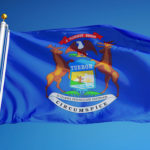 Michigan: The U.S. Supreme Court this week turned away a petition by 11 Republican Michigan legislators who sought to overturn expanded voting measures enacted through statewide ballot initiatives, bringing an end to the federal case known as Lindsey v. Whitmer. The federal case was always a longshot, experts told Votebeat when it was first brought before the Supreme Court, which hears only about 150 of the thousands of requests it gets each year. According to Votebeat, the justices denied the lawmakers’ petition without comment. But their attorney, conservative legal activist Erick Kaardal, told lawmakers that he’s not done trying to challenge the election measures, which include no-reason absentee voting, and straight-party voting, passed as part of 2018’s Proposal 3, as well as early voting and ballot drop boxes from Proposal 2 in 2022. The plaintiffs in the case are a group of Michigan lawmakers, not the Legislature itself. Several federal courts have shot down the case for lack of standing, challenging the plaintiffs’ right to sue as individual lawmakers. “Fortunately, the Michigan Supreme Court has held that individual state legislator standing exists … so we’ll continue pursuing that angle in state courts,” Kaardal said.
Michigan: The U.S. Supreme Court this week turned away a petition by 11 Republican Michigan legislators who sought to overturn expanded voting measures enacted through statewide ballot initiatives, bringing an end to the federal case known as Lindsey v. Whitmer. The federal case was always a longshot, experts told Votebeat when it was first brought before the Supreme Court, which hears only about 150 of the thousands of requests it gets each year. According to Votebeat, the justices denied the lawmakers’ petition without comment. But their attorney, conservative legal activist Erick Kaardal, told lawmakers that he’s not done trying to challenge the election measures, which include no-reason absentee voting, and straight-party voting, passed as part of 2018’s Proposal 3, as well as early voting and ballot drop boxes from Proposal 2 in 2022. The plaintiffs in the case are a group of Michigan lawmakers, not the Legislature itself. Several federal courts have shot down the case for lack of standing, challenging the plaintiffs’ right to sue as individual lawmakers. “Fortunately, the Michigan Supreme Court has held that individual state legislator standing exists … so we’ll continue pursuing that angle in state courts,” Kaardal said.
 New Jersey: Hudson County Superior Court Assignment Judge David Katz granted an order to show cause in a lawsuit brought forth by two 33rd Legislative District Assembly candidates seeking waterfront voting sites. The candidates filed a one-count lawsuit in Hudson County Superior Court on May 8th seeking three in-person voting locations on River Road, as well as one early voting site. The Hudson County Board of Elections, who are arguing that statutory deadlines have passed to allow for further polling sites, are represented by Deputy New Jersey Attorney General Craig S. Keiser. ” … Redistricting is not possible at this juncture as the deadline for any redistricting in advance of an election is 82 days prior to the primary election, March 20, 2025. Clearly, that deadline for redistricting has passed and the Board is not permitted to redistrict now,” he wrote in a letter to the court on May 13. “Moreover, even if redistricting was ordered outside the statutory deadline, such cannot be implemented for the June 2025 Primary Election, which is already underway with mail-in ballots having been sent to voters approximately three weeks ago and some already having been returned cast by voters.” Keiser further stated that only municipalities are permitted by law to recommend polling locations and that deadline passed on April 1st. Through that process, the board of elections added three polling locations in North Bergen and one in Weehawken.
New Jersey: Hudson County Superior Court Assignment Judge David Katz granted an order to show cause in a lawsuit brought forth by two 33rd Legislative District Assembly candidates seeking waterfront voting sites. The candidates filed a one-count lawsuit in Hudson County Superior Court on May 8th seeking three in-person voting locations on River Road, as well as one early voting site. The Hudson County Board of Elections, who are arguing that statutory deadlines have passed to allow for further polling sites, are represented by Deputy New Jersey Attorney General Craig S. Keiser. ” … Redistricting is not possible at this juncture as the deadline for any redistricting in advance of an election is 82 days prior to the primary election, March 20, 2025. Clearly, that deadline for redistricting has passed and the Board is not permitted to redistrict now,” he wrote in a letter to the court on May 13. “Moreover, even if redistricting was ordered outside the statutory deadline, such cannot be implemented for the June 2025 Primary Election, which is already underway with mail-in ballots having been sent to voters approximately three weeks ago and some already having been returned cast by voters.” Keiser further stated that only municipalities are permitted by law to recommend polling locations and that deadline passed on April 1st. Through that process, the board of elections added three polling locations in North Bergen and one in Weehawken.
 Ohio: James Saunders, 56, of Shaker Heights was convicted last week of voting multiple times in the last two general elections, was sentenced to three years in prison, a judge has ruled. Cuyahoga County Common Pleas Judge Andrew Santoli coupled Saunders’ sentence with a $10,000 fine, a punishment, as Santoli detailed in last week’s hearing, to match the severe violation against the nation’s voting laws. “You violated the premise that every citizen, regardless of race, creed or religion, speaks in one voice,” Santoli told Saunders from the bench. “Your opinion does not outweigh other citizens.” Throughout the case, the Cuyahoga County Prosecutor’s Office presented evidence that Saunders, who traveled regularly to a second home in Pompano Beach, Florida, attempted to cross states lines to vote multiple times, by mail and in person in Broward and Cuyahoga counties.
Ohio: James Saunders, 56, of Shaker Heights was convicted last week of voting multiple times in the last two general elections, was sentenced to three years in prison, a judge has ruled. Cuyahoga County Common Pleas Judge Andrew Santoli coupled Saunders’ sentence with a $10,000 fine, a punishment, as Santoli detailed in last week’s hearing, to match the severe violation against the nation’s voting laws. “You violated the premise that every citizen, regardless of race, creed or religion, speaks in one voice,” Santoli told Saunders from the bench. “Your opinion does not outweigh other citizens.” Throughout the case, the Cuyahoga County Prosecutor’s Office presented evidence that Saunders, who traveled regularly to a second home in Pompano Beach, Florida, attempted to cross states lines to vote multiple times, by mail and in person in Broward and Cuyahoga counties.
 Texas: Prosecutors dropped charges against Dr. Steven Hotze, 74, a prominent conservative activist related to allegations he had been part of what authorities have called a baseless voter fraud conspiracy theory in which a man was run off the road and held at gunpoint over claims he was holding fraudulent voter ballots. Hotze had been facing four charges related to allegedly helping plan an assault against an air conditioner repairman in October 2020. Prosecutors alleged the repairman was run off the road and held at gunpoint by Mark Aguirre, a former Houston police officer. Aguirre had worked for a firm hired by Liberty Center for God and Country, a nonprofit organization that Hotze runs, to pursue a voter fraud investigation. Aguirre had claimed the repairman was the mastermind of the voter fraud scheme and that the man’s truck had been filled with fraudulent ballots when Aguirre ran his SUV into it, according to authorities. Police who responded to the incident searched the repairman’s truck and found only air conditioning parts and tools, prosecutors said. Hotze was charged with four counts — aggravated robbery with a deadly weapon, aggravated assault with a deadly weapon, engaging in organized crime and unlawful restraint. The Harris County District Attorney’s Office dropped all four counts against Hotze and three of the five counts against Aguirre, who is still facing charges of aggravated assault with a deadly weapon and unlawful restraint. “This deeply troubling case shows how toxic conspiracy theories can fuel real-world violence that endangers people in our community,” Harris County District Attorney Sean Teare said in a statement. “We look forward to vigorously prosecuting the remaining charges in this case that stand up to legal scrutiny.”
Texas: Prosecutors dropped charges against Dr. Steven Hotze, 74, a prominent conservative activist related to allegations he had been part of what authorities have called a baseless voter fraud conspiracy theory in which a man was run off the road and held at gunpoint over claims he was holding fraudulent voter ballots. Hotze had been facing four charges related to allegedly helping plan an assault against an air conditioner repairman in October 2020. Prosecutors alleged the repairman was run off the road and held at gunpoint by Mark Aguirre, a former Houston police officer. Aguirre had worked for a firm hired by Liberty Center for God and Country, a nonprofit organization that Hotze runs, to pursue a voter fraud investigation. Aguirre had claimed the repairman was the mastermind of the voter fraud scheme and that the man’s truck had been filled with fraudulent ballots when Aguirre ran his SUV into it, according to authorities. Police who responded to the incident searched the repairman’s truck and found only air conditioning parts and tools, prosecutors said. Hotze was charged with four counts — aggravated robbery with a deadly weapon, aggravated assault with a deadly weapon, engaging in organized crime and unlawful restraint. The Harris County District Attorney’s Office dropped all four counts against Hotze and three of the five counts against Aguirre, who is still facing charges of aggravated assault with a deadly weapon and unlawful restraint. “This deeply troubling case shows how toxic conspiracy theories can fuel real-world violence that endangers people in our community,” Harris County District Attorney Sean Teare said in a statement. “We look forward to vigorously prosecuting the remaining charges in this case that stand up to legal scrutiny.”
Opinions This Week
National Opinions: Proof of citizenship | SAVE Act | DOJ Civil Rights Division
California: Real ID
District of Columbia: Ballot initiatives
Georgia: Fair Fight
Minnesota: SAVE Act
North Carolina: State Board of Elections, II, III | Election official
Ohio: Election security
Pennsylvania: Primaries | Early voting
Texas: Election legislation | Voter suppression
Upcoming Events
25 Years of Vote at Home with Adrian Fontes: Join The Vote at Home Institute for an insightful discussion on the current state and future of Vote at Home, featuring voices who have played key roles in shaping this system. Hear an update on Vote at Home practices, challenges, and opportunities from Arizona Secretary of State Adrian Fontes. Look back at Oregon’s pioneering Vote at Home system, led by the state’s Secretary of State, Phil Keisling. Finally, the Executive Director of the National Vote at Home Institute will share future opportunities in Vote at Home. When: June 4, 1pm Eastern. Where: Online
Election Science, Reform & Administration Summer Conference: The 9th Annual Summer Conference on Election Science, Reform, and Administration (ESRA) will take place from Monday, June 9 through Wednesday, June 11 2025 at Florida State University in Tallahassee, Florida. Planning for the conference is currently underway! Sign up for our mailing list to receive updates as information becomes available, including notifications about conference registration and programming. When: June 9-11. Where: Tallahassee, Florida.
iGO Summer Conference: The International Association of Government Officials will hold their summer conference in Kansas City, Missouri from June 20-24. Please refer to the iGO website for more information and to register for the event.
2025 National Association of Counties Annual Conference & Exposition: The National Association of Counties (NACo) Annual Conference is the premier gathering of elected and appointed officials from the nation’s 3,069 counties, parishes and boroughs. Conference content includes discussion of federal policies impacting counties, workshops lifting up county best practices, engaging general sessions, mobile tours across our host county, and more. NACo members also have the opportunity to influence the association’s direction and future during the Annual Business Meeting on the final day of the conference. When: July 11-14. Where: Philadelphia.
NASED Summer Conference: The National Association of State Election Directors will hold its summer conference in Oklahoma from July 22-24. Please refer to the NASED website for more information and to register for the event.
NASS Summer Conference: The National Association of Secretaries of State will hold its summer conference in Biloxi, Mississippi from August 4-7. Please refer to the NASS website for more information and to register for the event.
National Conference of State Legislatures Summit: NCSL is bringing the Legislative Summit back to Boston! Join us Aug. 4-6 to connect with legislators and staff from across the nation at an event jam-packed with great speakers, eye-opening policy sessions and after-hours experiences at some of Boston’s coolest venues. Help NCSL celebrate its 50th anniversary in style. When: August 4-6. Where: Boston
Election Center Annual Conference: The Election Center Annual Conference will be held in Salt Lake City. The conference will run August 20-22 and CERA courses will be offered August 23 and 24. The CERA courses offered will be: Course 5 (Ethics); Course 6 (Communications & Public Relations); and Two renewal courses to be announced. When: August 20 to 24. Where: Salt Lake City.
Job Postings This Week
electionlineWeekly publishes election administration job postings each week as a free service to our readers. To have your job listed in the newsletter, please send a copy of the job description, including a web link to mmoretti@electionline.org. Job postings must be received by 5pm on Wednesday in order to appear in the Thursday newsletter. Listings will run for three weeks or till the deadline listed in the posting.
Candidate Services Coordinator, Seminole County, Florida – The Candidate Services Coordinator is a key member of the Supervisor of Elections Office, responsible for ensuring smooth administrative operations with a focus on candidate services and assists with accounting functions and payroll processing. This position requires attention to detail, organizational skills, and the ability to effectively handle multiple responsibilities while maintaining confidentiality and compliance with applicable laws and regulations. This position is responsible for managing the candidate qualifying process, serving as primary point of contact for candidates, maintaining accurate records related to candidate filings, financial disclosures, and other required documentation, and coordinating candidate workshops and providing training on election procedures and campaign finance rules. Salary: $36,000 – $46,000 Annually. Application: For the complete job listing and to apply, click here.
Community Engagement Coordinator, North Charleston, South Carolina– Partner with the Community Engagement Manager to identify and expand non-partisan community relationships. Cultivate connections with local businesses and civic organizations to boost visibility and support. Solicit and analyze community feedback to enhance outreach strategies. Create brochures, flyers, presentations, and digital content to educate the public about elections and voting procedures.Collaborate with the Marketing and Communications Manager to maintain clear, consistent, and timely messaging across platforms. Manage and update the outreach section of the agency’s website. Deliver presentations and training during outreach events. Plan and coordinate mid-scale public events such as National Voter Registration Day and poll worker appreciation initiatives. Represent BVRE at outreach events, tabling opportunities, and community meetings. Track outreach activity and report on engagement metrics and outcomes. Support special projects including the “I Voted” sticker contest, Adopt a Polling Location, and poll worker recruitment. Research best practices to enhance and expand outreach programming. Assist in maintaining a centralized repository of outreach materials and resources. Salary: $50,440 – $66,060. Application: For the complete job listing and to apply, click here.
County Clerk, Lane County, Oregon– Lane County is seeking an experienced and dynamic leader to serve as County Clerk and Election & Recording Principal Manager, overseeing critical functions that uphold the integrity of our democratic processes and public records. This pivotal role leads a dedicated team committed to excellence, accuracy, and service to our community. As County Clerk, you will: Plan, organize, and conduct all federal, state, and local elections. Oversee voter registration, property tax appeals, and permanent real property records. Manage marriage licensing, domestic partnership registrations, and archived records. Ensure compliance with Federal, State, and Local laws governing elections and records. Lead a team of 14 full-time employees, ensuring exceptional service and operational efficiency. Prepare and analyze data, manage budgets, and oversee technology solutions that support Clerk operations. This is a fast-paced, high-impact role where you’ll serve as Lane County’s Clerk and Election & Recording Principal Manager, working under the direction of the Director of Operations to deliver services that affect all residents. Salary: $112,091.20 – $153,462.40. Application: For the complete job listing and to apply, click here.
Deputy County Administrator – Finance, Property & License Management, Otter Tail County, Minnesota: Otter Tail County is seeking a full-time Deputy County Administrator. This position will be part of the County Leadership Team overseeing the Finance, Property, and License Management Team and Countywide initiatives such as the Long-Range Strategic Plan. This position is responsible for overseeing and administering the duties and functions of an Auditor-Treasurer including financial operations and policy development, property recordings, assessor, elections, property tax administration, state audits, tax increment financing, property forfeitures, and ensuring compliance with state and federal regulations. This position would fulfill the appointed duties of an Auditor-Treasurer. Under the direction of the County Administrator, the Deputy County Administrator assists in managing and administering the affairs of the county and carrying out the policies of the County Board. This position is responsible to provide oversight in the planning, development, management, coordination, delivery, and evaluation of multiple complex functions of one of four service teams in the county organization. Lead interdepartmental and interagency work teams to improve county service alignment and performance. Priorities include service alignment, leadership and accountability to county-wide board goals. The Deputy County Administrator acts on behalf of the County Administrator in that person’s absence. Deadline: May 30. Application: For the complete job listing and to apply, click here.
Election Administration Manager, Oregon Secretary of State’s Office– In this role you will oversee all aspects of the Division’s work related to the technical administration of elections, including voter registration and election management and oversee all compliance-related aspects of the Division’s work on initiative, referendum, referral, and recall processes, candidate filings and qualifications, voters’ pamphlet filings and production, and translations of the voters’ pamphlet. Salary: $7,430 – $12,068/month. Deadline: June 1. Application: For the complete job listing and to apply, click here.
Election Director III, Baltimore, Maryland–An Election Director III is the supervisory or managerial level of work directing elections in local jurisdictions within the State. The work of this classification may require travel throughout the State to exchange information regarding the election process and promote voter registration. Employees supervise office support staff which may include subordinate supervisors. Employees in this classification receive managerial supervision from the State Administrator or Deputy State Administrator of Election Laws. Employees may be required to work evenings and weekends. Position allocation to the Election Director series is determined by the size of the local jurisdiction as reflected by the number of registered voters. Copies of this supplemental job evaluation standard can be found in the Offices of the State and local Boards of Elections and in the Department of Budget and Management’s Office of Personnel Services and Benefits. Salary: $95,991.00 – $176,552.00/year. Deadline: May 30. Application: For the complete job listing and to apply, click here.
Election Specialist, Candidate Services, Palm Beach County, Florida– This position is responsible for the management and execution of services provided to candidates, political committees, electioneering communication organizations, political parties, community development districts, and special taxing districts. This includes establishing and maintaining an organized system for managing the required forms and records associated with filing and qualifying for office, candidate petitions, campaign finance reporting, financial disclosures, initiative petitions, and other related activities. Candidate Services staff must be organized and personable with a great attitude, be able to work well in a team environment, and meet deadlines under pressure. Excellent work ethic, including consistent performance, integrity, reliability, and attendance, is a must. Must be detail-oriented, be able to handle simultaneous projects, and be a self-starter. Salary: $21.63 – $24.04. Application: For the complete job listing and to apply, click here.
Elections Director, Twin Falls County, Idaho– Performs a variety of administrative and logistical duties in administering the County’s elections. The Election Director ensures compliance with Federal, State and local requirements; sets up ballots and prepares test decks; communicates with and prepares candidate filing packets; processes campaign financial disclosures; secures polling places; reviews and adjusts voter list per statutory requirements; and interfaces with political parties, candidates and the general public. Employees in this class use independent judgment in applying existing policies and procedures to complete assignments, involving knowledge of multiple procedures and program guidelines to make decisions. Employees respond to non-routine inquiries and explain department services, policies, procedures and rationale for decisions to candidates and customers. Employees typically utilize a variety of computer operations and/or specialized software to complete daily assignments. The Election Director reports directly to the County Clerk and Chief Deputy Clerk. The principal duties of this class are performed in a general office environment and polling places. Salary: $25.75 Hourly. Deadline: May 26. Application: For the complete job listing and to apply, click here.
Elections Division Manager, Washington County, Minnesota– The Washington County Property Records and Taxpayer Services Department is seeking an experienced and collaborative leader to serve as our Elections Division Manager. We’re looking for a skilled manager with a strong background in election administration, voter registration, process management, or related fields. Experience leading complex operations, managing teams, and ensuring compliance with legal requirements will be highly valued. This position oversees all aspects of elections operations, ensuring compliance with statutory requirements and department objectives while leading a team of full-time and temporary employees to successfully administer federal, state, county, municipal, school district, and special elections. This is an excellent opportunity for a strategic thinker who excels under pressure, values integrity and transparency, and is dedicated to providing exceptional service to the residents of Washington County. Salary: $87,276 – $119,246. Deadline: June 5. Application: For the complete job listing and to apply, click here.
IT Assistant Manager, Palm Beach County, Florida– The Assistant IT Manager plays a supportive role in the smooth operation of the IT department, ensuring that both the technical infrastructure and the team are aligned with the organization’s goals. This position involves collaborating closely with the Election Technology Director to oversee the implementation of technology solutions that meet the needs of the organization. The Assistant IT Manager helps maintain an efficient and effective IT environment. Oversee daily operations of the IT department, including help desk operations and performance, troubleshooting issues, and ensuring efficient workflow. Hold department meetings and provide weekly performance summary. Manage IT projects under the direction of the Election Technology Director, ensuring timely completion, budget requirements, and organizational needs. Enforce IT policies and procedures to ensure data security, network access, and system availability. Assist in the management of IT staff by developing skills, coaching, and communicating job expectations. Coordinate vendor renewals, assist with IT budget development, and manage grant applications. Evaluate and assist in maintaining the organization’s disaster recovery and business continuity plans for IT. Assist with IT Public Records requests research and fulfillment. Assist the Election Technology Director in all facets of IT operations. Lead projects and mentor team members. Application: For the complete job listing and to apply, click here.
Physical Security Specialist, Palm Beach County, Florida– This position is responsible for administration of the physical security programs in a manner consistent with Supervisor of Elections Office policies, procedures, quality standards, and applicable local, state, and federal regulations. These programs include conducting facility security risk assessments, assisting with access control, monitoring alarms and CCTV systems, and providing security related training. Must be organized and personable with a great attitude, be able to work well in a team environment, and meet deadlines under pressure. Excellent work ethic, including consistent performance, integrity, reliability, and attendance, is a must. Candidate must be detail-oriented and understand the importance of security and safety for all. Must be available 24/7 365, be able to handle simultaneous projects, and be a self-starter. Application: For the complete job listing and to apply, click here.
Senior Elections Supervisor, Placer County, California– The Placer County Clerk-Recorder-Elections Office has a current vacancy for a Senior Elections Supervisor. The Office is looking for someone with experience in the development, supervision, and administration of elections programs. The ideal candidate will have supervised in an elections office or similar agency that emphasizes cooperation, accountability and transparency and has the ability to communicate effectively with management, staff, other county departments, jurisdictions and the voters of Placer County. To learn more about the Elections Division of the Clerk-Recorder-Elections Office please click here. In addition to the minimum education and experience, the ideal candidate will possess experience and vision in the following areas: State and federal election laws; Voting systems; General operating policies and functions of the California Secretary of State’s Office; Best practices and current trends in successful election administration, community education and outreach programs; Principles and techniques of effective employee supervision and development, training, management practices and public administration. Salary: $69,056.00 – $86,195.20/year. Application: For the complete job listing and to apply, click here.
Voter Registration and Absentee Manager, Charleston County, South Carolina– Are you driven by public service and committed to ensuring the accuracy of voter registration? Join us as the Voter Registration and Absentee Manager and lead a team dedicated to upholding the integrity of our processes. Welcome to the Board of Voter Registration and Elections, where we are not just an agency, but a dynamic force committed to excellence in democracy. As an award-winning organization, we pride ourselves on our relentless pursuit of improvement to better serve the voters in our community. This role is pivotal to ensuring secure, accurate, and accessible voter registration and absentee voting services. Salary: $70,000.00 – $82,000.00 Annually. Application: For the complete job listing and to apply, click here.
Voter Services Clerk, Seminole County, Florida – The Voter Services Clerk serves as the primary customer service representative for the Seminole County Supervisor of Elections Office. This position is responsible for the accurate maintenance and entry of voter registration information, ensuring the integrity and confidentiality of voter data, and providing essential assistance to voters, including answering inquiries and processing voter-related documents. The Clerk will also be involved in various clerical and administrative tasks associated with voter services, ensuring compliance with applicable state and federal election laws. Responsibilities include processing new voter registrations, updates or changes to existing registrations, vote-by-mail ballot requests, and returns, as well as petition verifications and other voter record-related tasks, providing accurate voter registration and election information to the public in person, by phone, or via mail, in accordance with Florida state laws, regulations, and procedures, conducting research to resolve issues related to voter registration records, utilizing sources both within the voter database and external government websites or online resources, ensuring the accuracy and completeness of voter registration records by verifying information, validating signatures on candidate and initiative petitions, maintaining and update street maintenance files to ensure an up-to-date and accurate residential address database for Seminole County. Salary: $17 – $22 Hourly. Application: For the complete job listing and to apply, click here.
Marketplace
electionline provides no guarantees as to the quality of the items being sold and the accuracy of the information provided about the sale items in the Marketplace. Ads are provided directly by sellers and are not verified by electionline. If you have an ad for Marketplace, please email it to: mmoretti@electionline.org